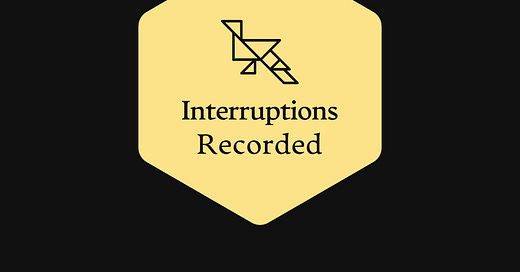Welcome to “Interruptions, Recorded,” a new podcast and interview series for the newsletter centering conversations on the edge of illness, identity, and narrative. This series features "outside voices" that trouble our understanding of belonging, success, and happiness in a world-in-crisis.
What does it mean to be “on the margins” in an increasingly fragmented world? What’s at stake when we consider “outside” and “inside” as discrete identity categories with no slippage in-between? Why are we obsessed with “normal people?” What helps us move away from modes of discourse—and ways of living—that wholeheartedly cling to normality (or wholeheartedly disavow it, which is just another way of reifying the center’s sick hold)?
Rather than grapple with these questions with experts, this show seeks to explore them with people who live along their edges every day. These are internet friends and book-club members, bad brains and waitress witches, people living and loving in the shadows of culture, interested in interruption as the practice "to nurture new flows and at the same time guard against them."
Here today to talk about these questions through the lens of OCD, mental ill health, and the nuclear family’s stunting effect on understanding masculinity, desire, and belonging is Shawn Dowling, a cartographer based in Columbus, Ohio. Shawn is one of the smartest, kindest people you’ll meet—a true intellectual, though he never found a place for himself within the bounds of normal education or academia. He loves difficult literature, trains, running ungodly distances in terrible temperatures, and is the closest thing I’ve ever had to a right-hand man as we try to build out a peer-to-peer care community on our little Discord corner of the internet.
Our conversation spans topics including Leopold Bloom’s refreshing unpalatability in Ulysses, the tricky intersection of mental illness, gender, and desire, and our reservations about the increasing atomization of identity in late capitalism even as we explore the legibility accorded by diagnoses and neurodivergence as a framework for living.
Reading Recs/Show Notes








